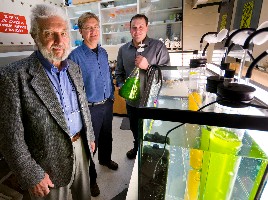
Researchers -- from left -- Keith Cooksey, Brent Peyton, and Rob Gardner (Kelly Gorham, Montana State Univ.)
Sodium bicarbonate, the familiar baking soda found in households worldwide, can increase the production of oil precursors from algae, according to researchers at Montana State University (MSU) in Bozeman. However, for baking soda to work with algae, it must be added a precisely the right time, and pinning down that time was a big part of the team’s investigation.
The team included professors Keith Cooksey and Brent Peyton, from the university’s microbiology and engineering faculties respectively, and engineering grad student Rob Gardner.
The search for a chemical trigger to boost oil production in algae did not come easily, say the scientists. Not only did they have to find a chemical that would work, but they had to figure out the best time to add it to the algae. Gardner grew the algae in three labs across campus. He then conducted experiments and shared his progress with Cooksey and Peyton. Gardner says they worked for about 1 1/2 years before they could confirm that baking soda was the chemical trigger they’d been seeking.
Cooksey says baking soda’s potential comes from the extra carbon dioxide it gives algae for algae’s metabolism at a key point in its life cycle. If the baking soda is added too early or too late, the algae don’t respond. But when added at just the right time in the growth cycle, algae produce two to three times the oil in half the time of conventional growth models. The oil, or lipid, is composed of triacylglycerides, the precursors to biodiesel and biojet fuel.
MSU is now offering the team’s technology for licensing to the biofuels industry.
Related:
- Fuels Developer Claims Large-Scale Hydrogen from Algae
- Biotech Company Delivers Algae-based Jet Fuel to U.S. Navy
- Algae Biofuels Project Advances from Lab to Greenhouse
* * *

 RSS - Posts
RSS - Posts
[…] This post was mentioned on Twitter by Zachary Alexander, Alan Kotok. Alan Kotok said: Baking Soda Improves Oil Output from Algae | #Science #Business http://t.co/n1i2NFp #ScienceBusiness […]